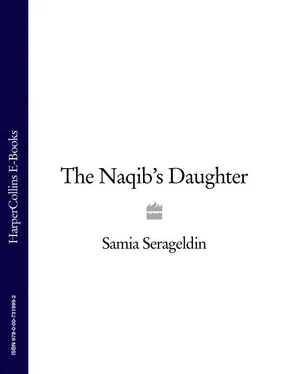Only a few days ago it had seemed as though there would be no mulid dolls this year, and no sugar-paste horse for her younger brother, either. No one was in the mood to celebrate with the Franj occupying Cairo, and so many families in the city mourning their dead. But then the Franj had decreed that the mulid would be celebrated as usual, as would the ceremony of the Nile flood; fines would be levied on merchants who did not keep their shops open and festoon them with garlands, and on any guilds that did not organize a parade.
But it was not thoughts of the parades or the musicians, the dervishes or the dancers that excited Zeinab to the point of sleeplessness: it was the prospect of witnessing the Franj’s flying ship. They had posted signs all over town announcing that after the annual ceremony of the Nile flood, and after the mulid parade, they would demonstrate a special flying ship that could fly over the houses and the trees and the city walls and, who knew, perhaps over the Red Sea itself; a flying ship in which people could ride over the clouds like the magic carpets in the stories of the Thousand and One Nights . The French claimed they had used these flying ships in battle to spy on their enemies and defeat them. The soldiers had distributed posters printed on their Arabic press announcing that this great French invention would take off from Ezbekiah Square that Friday.
Zeinab’s excitement had been roused to fever pitch by the sight of preparations on the Ezbekiah esplanade not far from her house, where for several days the French engineers had been seen building a platform and setting up their equipment. She had begged to be allowed to attend the great spectacle, and her father had promised, but she fretted that he might forget all about it or change his mind.
All morning Zeinab looked out of her mashrabiyya window at the mulid procession passing in the street below: the drummers and the shrill pipers, the dancing women swaying their hips, the tumblers, the shrieking monkeys and chained bears, the serpent handlers, the puppeteers with their vulgar cries, the singers and the female poetesses. The street sellers hawked their wares: tamarind, carob and liquorice juice, roasted peanuts and ruby-red watermelon, date-and-nut-filled pancakes. Then the guilds, each in turn, parading with their banners: scissors for the tailors; a net for the fishmongers; bracelets for the jewellers; a gun for the barudis, the gunpowder manufacturers. The Sufi orders followed, preceded by the dervishes whirling their capes in rhythm with the chanting and drumming. The float in the shape of Noah’s Ark came next, heralded by a resounding fanfare.
Zeinab could hardly bear to wait for word from her father. Shaykh Bakri himself had gone ahead earlier in the morning with other notables accompanying the commandant of the French to the Nilometer for the annual ceremony of the breaching of the dam. An hour or so later the floodwaters of the Nile had come rushing through the khalig canal, and the firing of cannon and the shouts of rejoicing had carried all the way to the Ezbekiah. By now, Zeinab calculated, there would have been ample time for the commandant and his party to ride back for the demonstration of the great flying machine.
Dada burst into the room, holding Zeinab’s younger brother by the hand.
‘Yallah, Sitt Zeinab, Shaykh Bakri sent for us. Let us hurry or we will miss the flying of the airship!’
Zeinab jumped up and let her wet-nurse dress her, for the first time, in a long black cloak and a small, transparent white yashmak veiling the lower part of her face. She felt very grown up.
They hurried down to the Ezbekiah esplanade, where the sun had crossed its zenith. A bevy of Frenchmen with their shirtsleeves rolled up were hurrying up and down the steps leading to the great wooden platform. Tall masts had been set up at each of the four corners of the platform, and an enormous sail was stretched out between them. It looked like no other sail Zeinab had ever seen: the fabric was of silk in the dark blue, white and red that everyone had come to associate with the French, and it was encircled by a design featuring a golden crown and an eagle. The ends of the gigantic sail were being drawn in and attached with cords to a large basket that sat in the middle of the platform.
Zeinab never took her eyes off the head engineer who was clearly in charge: a dark, curly-haired man with an eye patch who gave orders right and left and occasionally stood back to mop his brow with the scarf tied round his neck. In the manner of the French, he was clean-shaven and bareheaded, and did not disdain to put his own hands to the task in his impatience. From time to time he sat down and brought out a leather-bound stack of papers and began sketching rapidly.
Her curiosity to see inside the mysterious cane basket at the centre of this bustle was like an unbearable itch. She grabbed her brother’s hand and edged as close as she could, despite her nurse’s remonstrations. Then she saw Shaykh Jabarti, completely engrossed, standing very close to the platform, and that encouraged her to advance till she could speak to him.
‘My esteemed teacher, what is in that basket?’
Shaykh Jabarti turned and looked down at her in astonishment, then recognized her through the transparent yashmak.
‘Ah, so they dress you as a woman now, do they, little monkey,’ he grumbled. ‘Well, perhaps we can obtain permission for you to see.’
Shaykh Jabarti spoke to one of the translators, who spoke to the chief engineer; he nodded, in a harried manner, hardly glancing at them.
With Shaykh Jabarti leading the way, Zeinab and her brother climbed the stairs to the platform and approached the basket. Close up, it was sturdier and larger than it looked, easily accommodating two or three standing men, and high enough to reach the armpit of a man, so what the French had claimed about sending soldiers up in the air could be true. But would there be air to breathe that high?
She could not see all the way inside the basket, but there seemed to be some sort of large lamp or stove with a wick, and straw and other stuff around it. Presently the chief engineer gave the order and fire was set to the wick in the lamp. The crowd exhaled in alarm as the flames shot up, and then went speechless in awe as the sail began to fill up like a balloon, the cords tying it down to the masts taking the strain.
A fanfare announced the arrival of the procession of the commandant and the accompanying notables, and Shaykh Jabarti signalled to Zeinab that it was time to get off the platform and to return to her nurse, who was standing further back.
The great assembly of the French arrived, officers and gentlemen and the laughing ladies in their finery. She had never seen women like them, with their bosom-baring wisps of gowns, and their cascades of curls under high-brimmed, feathered bonnets. Zeinab absorbed every novel detail of their attire: gloves and fans, reticules and parasols, down to the embroidery on the hem of a shawl and the lace trim of a bonnet. One lady in particular stood out with her fluty laugh and her hair of spun gold; the feathers and ribbons on her bonnet, her gloves and slippers were all dyed a shade of delicate mauve that offset the palest pink of her gown. The commandant of the French noticed her and stopped to speak to her for a few minutes, and she tossed her head and laughed till he moved on.
Zeinab watched the commandant approach the platform and greet the chief engineer and his helpers. They seemed to be having an argument, the man with the eye patch shaking his head repeatedly and mopping his brow, the general making encouraging gestures and waving to the assembled crowd.
By now the balloon had formed an egg-like globe, tapering down to the basket, and straining alarmingly against the cords whenever a breeze blew, like a marid struggling against his chains. A cannon was fired to announce the launch, and everyone held his breath. Zeinab was disappointed that no Frenchmen would be climbing into the basket after all. Then the chief engineer gave the sign, the cords holding it down on all four sides were cut simultaneously, and the great sphere rose in the air, greeted by a deafening cheer from the crowd. Zeinab held her breath, her eyes fixed on the airship rising in the sky, lurching slightly as it caught in a breeze.
Читать дальше












